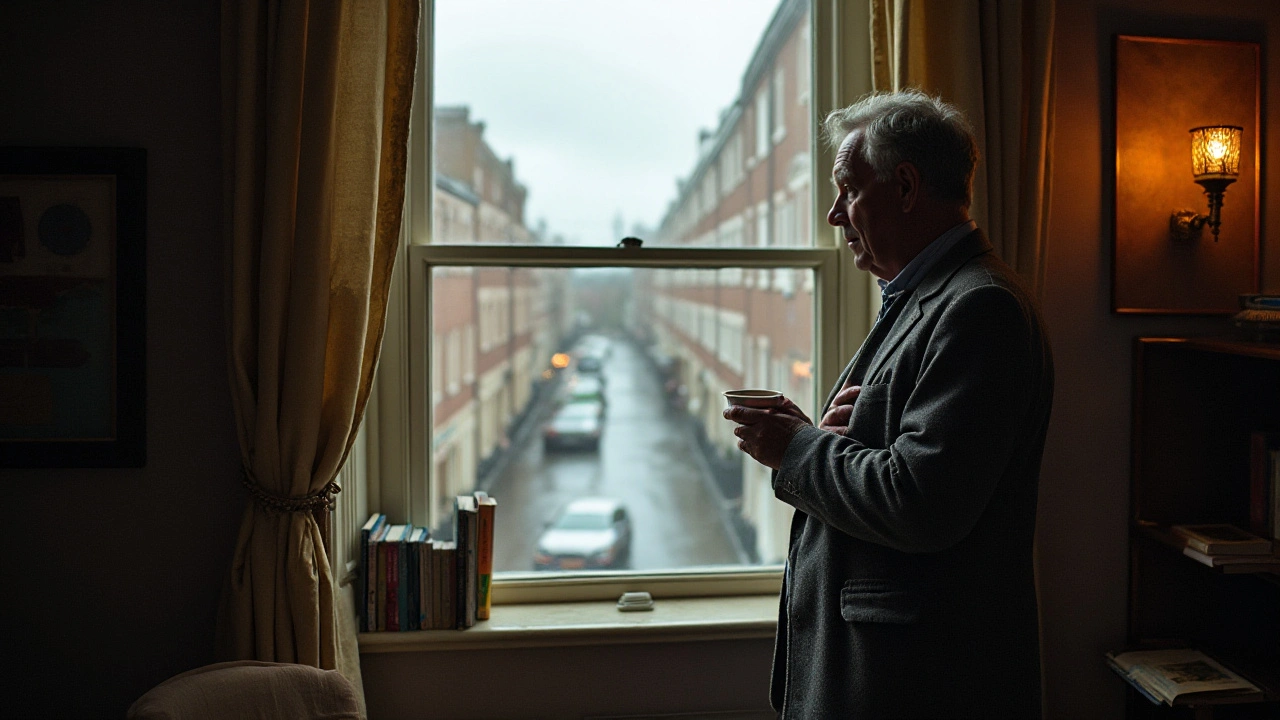In a world where information is at our fingertips, it's easy to spiral into a cycle of worry over our health. Health anxiety is a common experience, affecting people who find themselves preoccupied with thoughts of illness, often despite the absence of a medical issue.
Understanding this form of anxiety is the first step toward regaining control and finding peace. Though it may start as a small seed of concern, it can grow into a significant disturbance if left unchecked. Fortunately, there are ways to address health anxiety that involve recognizing our own thought patterns, developing resilience, and seeking appropriate help.
This article serves as a comprehensive guide to navigating the complexities of health anxiety, providing strategies and insights that foster a healthier relationship with one's body and mind.
- Recognizing Health Anxiety Symptoms
- The Psychology Behind Health Anxiety
- Effective Coping Mechanisms
- Seeking Professional Help
- Building a Supportive Environment
Recognizing Health Anxiety Symptoms
Understanding health anxiety begins with knowing how to identify it. Many individuals find themselves trapped in a cycle of incessant worry over their well-being, despite having received reassurance about their health. Among the most common symptoms is an intense preoccupation with having, or acquiring, a serious illness. This preoccupation is not fleeting; it persists for six months or longer. Those experiencing health anxiety might frequently examine their bodies for signs of illness, focusing heavily on normal bodily sensations or minor symptoms. They often feel an overwhelming urge to seek constant reassurance from doctors or loved ones, even though this reassurance has little effect on easing their anxiety.
Those dealing with this type of anxiety can also experience a range of physical sensations that further fuel their worries. They might complain about pains that can't be explained by medical tests, or they could be hypersensitive to bodily functions like heartbeat, sweating, or digestive processes, interpreting them as indicators of severe conditions. Interestingly, this form of anxiety doesn't always accompany other anxiety disorders. It can exist autonomously, feeding on the fear of what might be, rather than what is. On noting these symptoms, differentiating between rational health concerns and anxiety-driven fears becomes crucial. Accurate recognition allows individuals to navigate their thoughts in more constructive ways.
Another hallmark of health anxiety is the role of technology in amplifying fears. The phenomenon known as 'cyberchondria' has become more pronounced with the advent of the Internet. People may compulsively search for information about potential health dangers online, often ending up more anxious than before they started. While searching, they may stumble upon frightening diagnoses that align too closely with their perceived symptoms, even if the chances of such diagnoses are extraordinarily slim. This kind of behavior not only exacerbates anxiety but can also strain relationships, as family and friends may grow weary of repeated discussions around health worries.
"It’s a unique brand of anxiety that centers around the body," explains Dr. Mark Freeman, a leading psychologist in anxiety disorders at Mindful Health Institute. "What makes it particularly challenging is its self-perpetuating nature. People are not just worried about their health; they believe their very existence is under threat, which can understandably be debilitating."
Understanding the cognitive and behavioral patterns that underpin health anxiety is essential for those aiming to gain the upper hand over their worries. These behaviors often lead individuals to avoid situations that might remind them of illness, such as hospitals or discussions about health. Ironically, this avoidance can lead to increased anxiety over time because it reinforces the notion that these situations are indeed dangerous. Observing these patterns can be the first step toward addressing them.
The Psychology Behind Health Anxiety
Delving into the murky waters of the mind, health anxiety can often feel like a labyrinth with hidden corners at every turn. It's a complex dance of thoughts, where fears about health become a frequent visitor to the mind's stage. Rooted deeply in the intricate tapestry of human psychology, health anxiety, or hypochondriasis as it's sometimes clinically known, is not merely a figment of imagination. It holds the power to cast genuine shadows on how one experiences life, physically and emotionally. This condition often emerges as a byproduct of the very survival instinct that humans have honed over millennia. In times long past, being acutely attuned to bodily sensations was crucial for survival. However, in our current world, this instinct, coupled with a modern-day influx of health information, can tip the scales, leading to persistent concern over health.
Research suggests that individuals with a predisposition to anxiety may be more vulnerable to developing health anxiety. The brain’s threat-detection system gets hyperactivated, misinterpreting normal bodily sensations as alarming signs. Imagine a day when your heart races because of caffeine, yet your mind spirals into fear of an impending heart attack. Dr. Bruce Levine, a clinical psychologist, notes, "In health anxiety, the mind seeks certainty about health, but paradoxically, this quest only breeds more uncertainty." Such thoughts can be further amplified by personal experiences, such as a traumatic health scare or witnessing a loved one's illness. The role of cognitive biases cannot be understated. Those with health anxiety often exhibit cognitive distortions such as catastrophic thinking, where minor illnesses are exaggerated into terminal illnesses, and selective attention, focusing solely on negative health-related information while dismissing reassurance from medical professionals.
It's also noteworthy that our brains have a tendency to fill in gaps with assumptions, often negative. Take, for instance, the concept of the 'white coat effect', where anxiety spikes in clinical settings because of an association with negative health news. This shows how our environments and previous experiences shape our mental responses. A fascinating element in understanding health anxiety is the role of reassurance-seeking behavior. While seeking reassurance from doctors or loved ones might offer temporary relief, it inadvertently strengthens anxiety over time. This cycle becomes a trap. Experts in cognitive-behavioral therapy focus on breaking this cycle, helping people to relearn thinking patterns. Encouragingly, evidence-based approaches, like cognitive behavioral therapy (CBT), have shown effectiveness in helping individuals retrain their thinking processes to manage these anxieties better. These insights provide a window into the mind of someone living with health anxiety - where the echoes of worry swirl, yet there are pathways towards change and peace.

Effective Coping Mechanisms
Dealing with health anxiety can often feel like an uphill battle, but there are proven strategies that can help calm the storm. To begin with, identifying the triggers that set off anxious thoughts can be tremendously beneficial. These might include certain medical TV shows, news updates, or even specific conversations. Once you're aware of what throws you off balance, you can take steps to either avoid or approach them with a newfound resilience. It’s like building a personalized toolbox from which you can take out the right tool for the right situation. Recognizing each trigger helps in predicting the emotional scenarios that might play out, allowing one to prepare mentally before a situation worsens. This proactive step is like preemptively fixing a dam before the rain hits, ensuring mental floods are kept in check.
Another vital component in managing health anxiety is practicing mindfulness. It’s not just a buzzword from meditation circles; it’s a research-backed technique that works. By immersing yourself in the present moment, you can alleviate stress about the unknowns of the future. Techniques such as deep breathing, meditation, or yoga help ground you in the now, warding off those spirals of worry. Think of it as anchoring yourself during a storm; by focusing on the sensation of your breath or the grounding energy of a yoga pose, you direct your mind's eye away from chaotic waters into calmer ones. Studies show that regular mindfulness practices can significantly decrease anxiety and improve overall mental well-being, making it a worthy addition to any daily routine.
Cognitive Behavioral Therapy (CBT) is another powerful ally in learning how to handle health anxiety. By addressing the often irrational beliefs and fears directly, CBT helps retrain your mind, showcasing healthier thought patterns. According to the Anxiety and Depression Association of America, CBT is effective in 75% of cases, which is significant. With time, CBT teaches that thoughts are not facts and equips individuals with the ability to challenge and change their perspective. You begin to see that not every headache is a brain tumor, nor every stomachache a vicious disease. This therapeutic approach turns down the volume on that internal fear-based narrator, allowing for reason and logic to steer the conversation.
Engaging in regular physical activity is yet another coping mechanism that can be transformative. Exercise is not just about fitness; it’s about mental health, too. When you move your body, something magical happens—endorphins get released, elevating mood and offering a natural defense against anxiety. A simple walk, a session at the gym, or even a dance class can make a tremendous difference. Our physical and mental states are deeply intertwined, and by actively choosing movement, you upset the stagnant cycle of anxious thinking. It's like shaking up a snow globe; that sediment of worry gets disrupted, allowing clarity to filter through.
Lastly, cultivating a support network is crucial. Whether it’s friends, family, or a professional therapist, having people to confide in can act as a pressure valve for stress. Sometimes, merely voicing concerns out loud lessens their grip. Human connection acts as a balm to anxiety's heartsickness, reminding individuals they're not alone in their journey. Opening up might feel daunting at first, but it can transform the shadows of fear into shared, lighter burdens. In the words of the renowned therapist Brene Brown,
“Vulnerability sounds like truth and feels like courage. Truth and courage aren’t always comfortable, but they’re never weakness.”Building this support system isn't just about reaching out during hard times but creating bonds that reinforce resilience over time.
Seeking Professional Help
Taking the step to seek professional help for health anxiety can feel daunting. However, it's an empowering choice that can lead to significant relief and personal growth. Many people are unaware that health anxiety often corresponds with underlying mental health conditions such as generalized anxiety disorder or OCD, where irrational fears about bodily sensations dominate one's thoughts. Understanding these associations aids in identifying which treatment approaches may work best when engaging with a therapist or healthcare provider.
The process typically begins with a detailed assessment by a mental health professional who can help differentiate health anxiety from other disorders and ascertain its severity through standardized questionnaires and interviews. This allows the patient and clinician to develop a tailored treatment plan that focuses on the unique challenges presented by health anxiety. Cognitive-behavioral therapy (CBT) has been identified as an effective approach, targeting the maladaptive thought patterns that drive the anxiety and teaching patients strategies to challenge and alter those thoughts. Studies have shown that individuals who undergo CBT report a marked improvement in symptoms and quality of life. A 2023 survey published in the Journal of Anxiety Disorders highlighted that nearly 78% of participants experienced increased mental well-being after twelve weeks of therapy.
In addition to therapy, some may benefit from medication, particularly when anxiety significantly interferes with daily functioning. Antidepressants, such as SSRIs, have been found beneficial in treating anxiety disorders by modulating brain chemistry. However, medication is generally used in conjunction with therapy and requires careful monitoring by a qualified psychiatrist. Being open with your healthcare provider about your experiences and any concerns with medication can facilitate better outcomes and a smoother treatment journey. It's essential to recognize that seeking help is not a one-size-fits-all scenario, and it may take some exploration to pinpoint what works best for you.
Professional support plays a crucial role in navigating the repercussions of health anxiety within everyday life. Group therapy or support groups can be an excellent adjunct to individual treatments. They offer the chance to share experiences and coping strategies with others who understand the challenge of living with anxiety related to health. The encouragement and validation received from peers can complement the individualized attention of therapy, providing a well-rounded approach to care. As Dr. Sarah Williams, a notable psychologist, once said in her work on anxiety disorders,
"Connecting with others who speak the unspoken language of anxiety can transform fear into a shared resilience."

Building a Supportive Environment
When grappling with health anxiety, the isolation of constantly battling with one's mind can become overwhelming. Establishing a supportive environment can be pivotal in alleviating these struggles and promoting a sense of belonging and understanding. This support network may include family, friends, mental health professionals, and online communities committed to navigating similar challenges. By opening up to those around us, we allow trusted individuals to offer insight, encouragement, and resources, creating a buffer against the relentless worry. Humans are inherently social creatures, and research has consistently demonstrated the benefits of a robust support network for mental well-being, yet misconceptions about vulnerability often hold people back from reaching out.
Creating this nurturing space begins with honest communication. Start by sharing experiences and feelings with those closest to you, expressing precisely how mental health has been impacted by the anxiety you face. This transparency not only helps others understand the depth of the struggle but also opens the floor for them to share their thoughts and fears. Remember, building a support system is a reciprocal process; offering an ear or advice when needed can solidify these bonds. Many people underestimate the power of a shared meal or walk when it comes to fostering connection and understanding. Mental health thrives on these moments of genuine engagement, where individuals can feel seen and heard.
"The capacity to be vulnerable is the cornerstone of emotional intelligence, and it's what ties us to each other," said Dr. Rachael Lewinski, a renowned psychologist in mental health studies.
Incorporating Professional Guidance
Utilizing professional guidance from therapists or counselors can serve as a cornerstone for your support network. These professionals bring invaluable expertise and can offer tailored strategies to manage anxiety relief. Traditional therapy, such as cognitive-behavioral therapy (CBT), has proven effective in confronting irrational fears linked to health anxiety. Additionally, exploring other approaches—like art therapy or mindfulness-based stress reduction—might uncover new avenues for healing. Working with a professional removes the stigma of facing challenges alone and provides a structured plan for implementing change. Studies suggest individuals who engage in regular therapeutic sessions experience a significant decrease in anxiety levels over time.
A social support network isn't limited to people you know personally. Exploring online forums and groups dedicated to health anxiety can introduce you to a broader community. These platforms allow for the exchange of tips, stories, and coping techniques with people worldwide. The anonymity can provide a safe space where one doesn't fear judgment, encouraging open discussions on struggles and successes related to health concerns. As long as credible sources and communities are chosen, the internet can be an invaluable tool in expanding one's support network. Whether through discussions, shared resources, or virtual support groups, these platforms prove that you are never truly alone in your journey.
